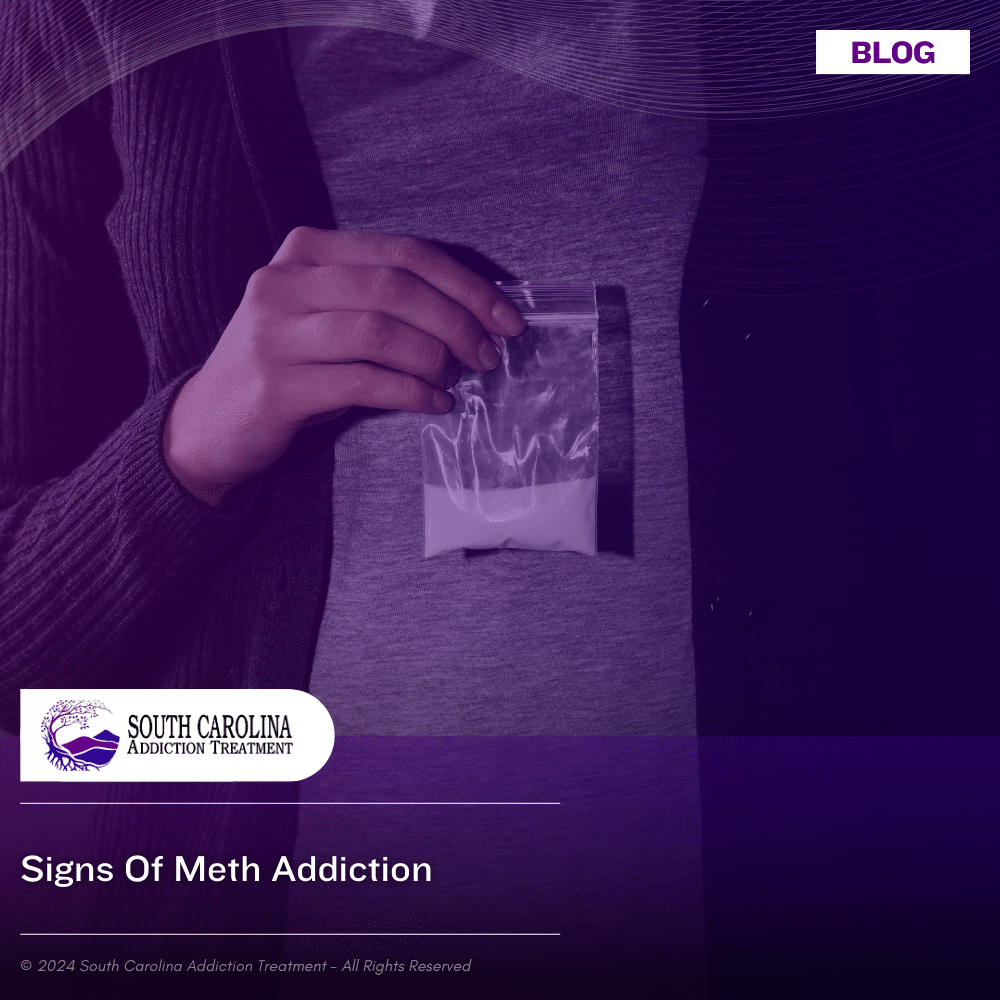Signs of Meth Addiction

Medically Verified: 2/1/24
Medical Reviewer
Chief Editor

All of the information on this page has been reviewed and verified by a certified addiction professional.
Methamphetamine, or “meth”, is a powerful central nervous system stimulant that can be snorted, smoked, injected, or taken by mouth. Compared to amphetamine, more methamphetamine gets into the bloodstream and to the brain. This makes it a very potent–and potentially addictive–substance.
In 2020, more than 2.6 million people ages 12 and up used methamphetamine.[1]
People who use methamphetamine recreationally are at serious risk of developing an addiction to the drug. Nearly 1.5 million people were addicted to meth in 2020.[1] Left untreated, methamphetamine addiction can lead to serious consequences in every part of a person’s life. Their body and mind can quickly fall prey to the devastating effects of this insidious drug. In a short time, they may experience serious financial, legal, and social problems.
It is important to get addiction treatment as soon as you realize there is a problem. Learning about what to look for can help you recognize the signs of meth addiction, either in yourself or someone you love. The signs of meth addiction can be physical, emotional, and behavioral.
Living with addiction–or loving someone who does–can feel lonely, but you are not alone. Reach out to the staff at South Carolina Addiction Treatment for information about our comprehensive treatment programs. We believe anyone can recover from methamphetamine addiction if they have the right support. If you take the first step, we will join you on your recovery journey.
Physical Signs of Meth Addiction
When someone is addicted to meth, it can be easy to see. Meth addiction takes a serious toll on a person’s appearance and physical health. Some of the physical signs of meth addiction are:
- Burn marks on fingers
- Burns around the mouth
- Track marks
- Thinning hair
- Red eyes
- Significant weight loss
- Sores or scratches
- “Meth mouth”–severe tooth decay, bleeding gums, or sores in the mouth[2]
The method a person uses to ingest methamphetamine will determine where you notice the physical signs of meth addiction. You may also see paraphernalia related to methamphetamine use. This can include:
- Glass pipes
- Needles
- Tournaquits
- Spoons
- Rolled up dollar bills or straws
- Spoons
- Small plastic baggies
For the best chance at a complete, long-lasting recovery from addiction, you must get help right away. Seek treatment at the first signs of meth addiction.
Behavioral Signs of Meth Addiction
Meth addiction can quickly take over a person’s mind and body, and often causes significant changes in their behavior. As the addiction overtakes their life, you are likely to see some of the following behaviors:
- Decreased sleep
- Reduced appetite
- Lying or hiding drug use
- Illegal activities
- Increased risk-taking
- Isolating from friends and family
- Giving up activities they used to enjoy
People who are addicted to meth can very quickly begin to fall behind in every area of their lives. They may fail to take care of their responsibilities at home, school, or work. A person who used to have stability may find themselves in legal or financial trouble. It is important to pay attention to these behavioral signs and seek treatment as quickly as possible.
Mood-Related Signs of Meth Addiction
Since methamphetamine is a stimulant, it causes an increase in activity in the central nervous system (CNS). This can have significant, noticeable effects on a person’s mood. In the short term, people may experience:[3]
- More energy
- Increased alertness
- Faster heart rate
- Increased blood pressure
- Higher body temperature
Using methamphetamine can give people a sense of energy and euphoria as it works in the CNS and brain’s reward centers. But people may also experience unpleasant symptoms related to this increased CNS activity. This can include:
- Irritability
- Violent outbursts
- Mood swings
- Paranoia
- Hyperactivity
After a methamphetamine binge, people are prone to “tweaking”. Tweaking involves a period of intense anxiety and paranoia and little to no sleep for several days at a time. It is a definitive sign that the person requires treatment to overcome their addiction to meth.
What to Do If You or Someone You Love is Addicted to Meth
If you recognize the physical, behavioral, or mood changes that can be signs of meth addiction, you must act fast. Treatment for meth addiction can mean a new chance at living a healthy, fulfilling life.
Methamphetamine addiction treatment usually consists of several evidence-based treatments, including:
- Medically supervised detox services
- Individual therapy
- Group support
- Family therapy
- Medications
- Mental health and medical treatment
- Education
Some rehab facilities also offer holistic services that can help the body and mind heal during treatment.
Getting someone to go to rehab can sometimes be challenging. Consider hiring a professional interventionist to plan and manage an effective intervention. Learn as much as you can about addiction and available treatment options. Remember that your loved one did not choose addiction and that they can heal if they have the love, support, and treatment they need.
Learn More About the Signs of Meth Addiction at South Carolina Addiction Treatment
If you or someone you love requires addiction treatment or support at any stage of recovery, reach out to the staff at South Carolina Addiction Treatment for information about our comprehensive, adaptable programs. Call today to speak to one of our admissions counselors about how we can support you on your recovery journey.
References:

